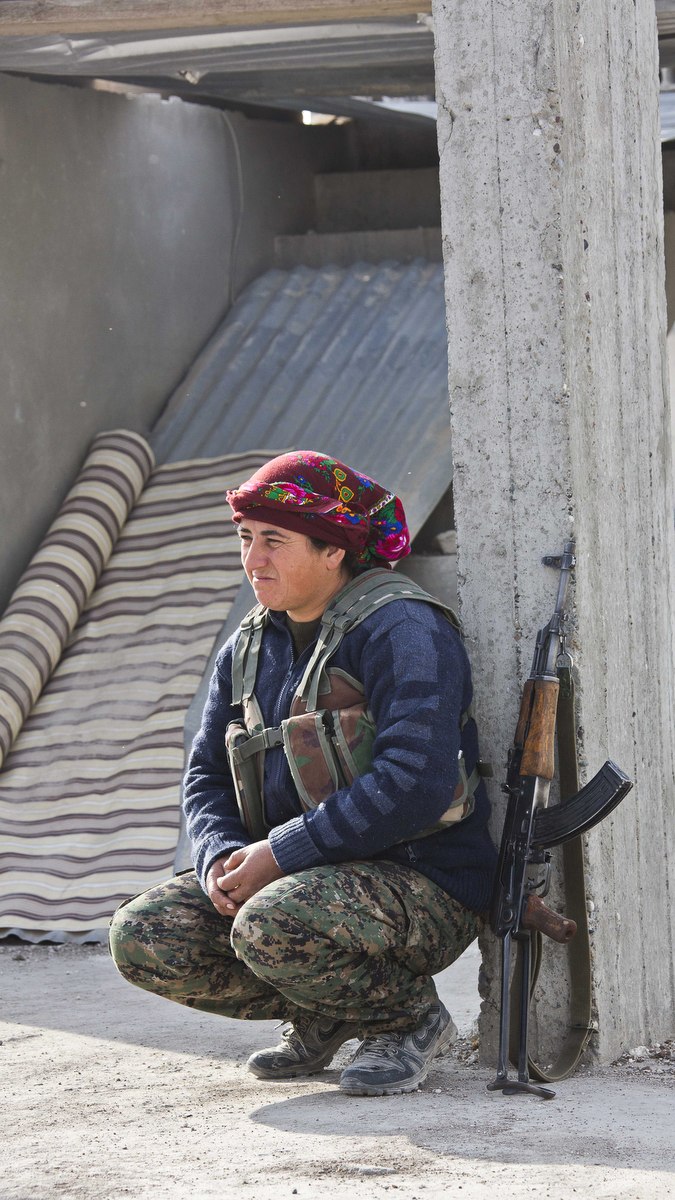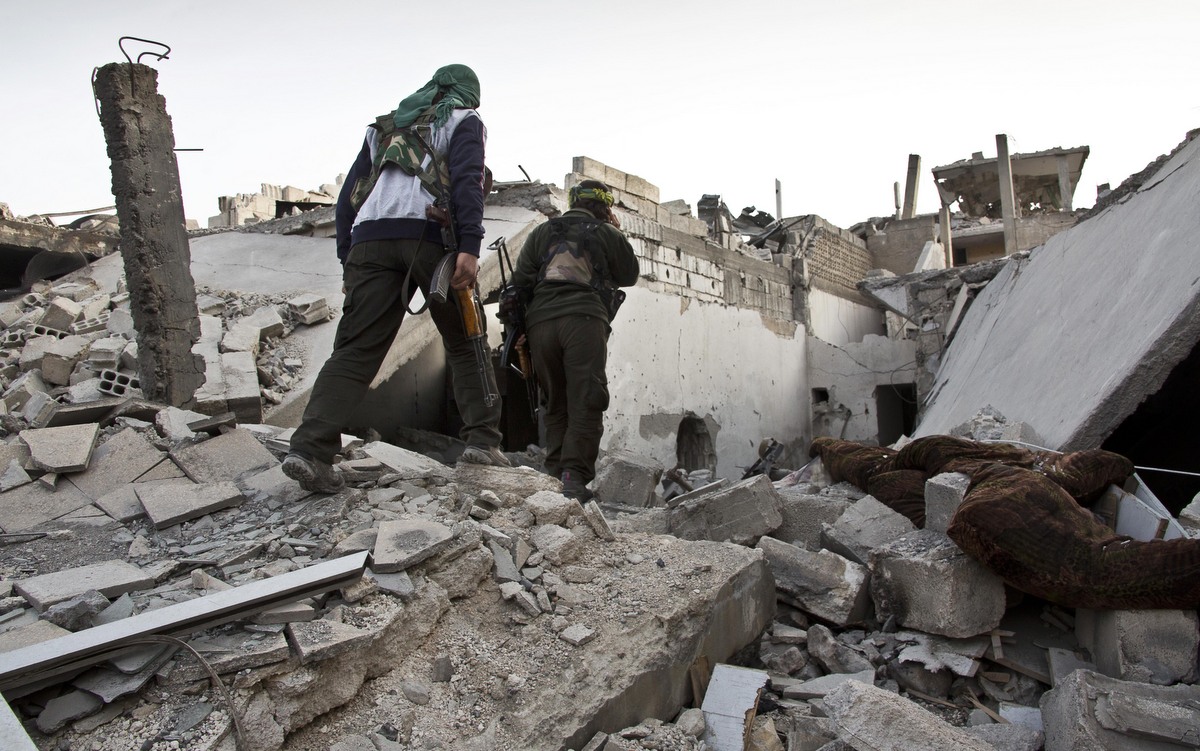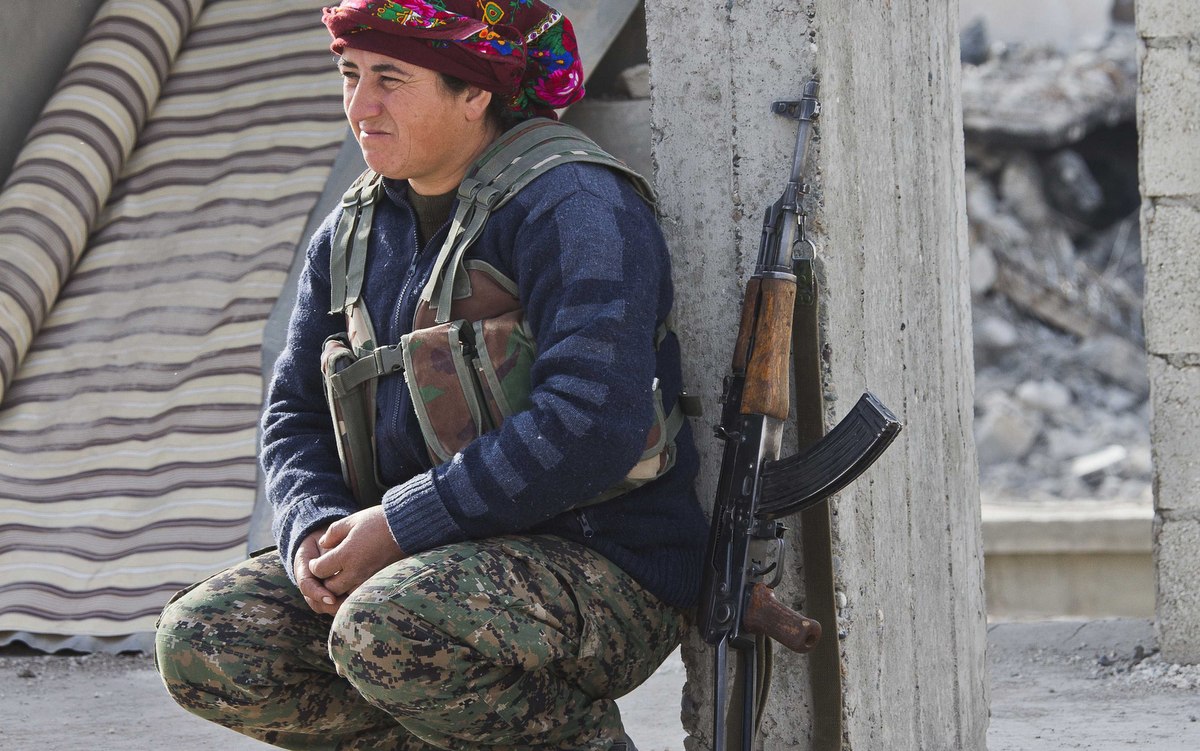TELL HAMIS, Syria — Zatlaan bends down around a fledgling fire, blowing the kindling carefully, willing the damp pile of scrap wood to catch. Zatlaan — who asked that only
her first name be used — is completely decked out in camouflage, spare a colorful traditional scarf wrapped tightly around her head.
The dozen women leaning into the heat of the fire, trying to warm their freezing fingers on a cold, dreary Syrian night while carefully balancing Kalashnikov assault rifles between their knees, all take orders from Zatlaan, their commander.
These women, also fully clad in camo, with extra ammunition hanging from green vests, are members of the Women’s Protection Unit (YPJ), an all-women’s Muslim-Kurdish guerrilla militia based in the far north of Syria (termed Rojava by the Kurdish population) known for its staunch fight against the Islamic State of Iraq and Syria (ISIS).
The night is eerily quiet. ISIS, whose territory lies less than 4 kilometers away from YPJ lines, is not advancing or firing at their trenches on this particular night. Instead, the small circle of women around the fire feels more like a campsite, rather than an unstable and at times free-flowing frontline near Tell Hamis, northeast Syria.
The fire picks up, dry wood catching, and Zatlaan takes a seat with the rest of the women. She explains that she is half Jewish, half Christian, and that most of the women here were raised Muslim — most of them Kurds, but some Arabs. Here on the frontline, and in the YPJ in general, she says none of that matters.
“We don’t care what you are, or who you pray to,” Zatlaan said. “We are comrades here, we are fighting for the same thing and we embrace anyone who wants to join our fight.”
That fight is one that looks to build an inclusive autonomous region in the northeast out of the fires of civil war-torn Syria, according to the Democratic Union Party (PYD), the political party that the YPJ fights under the banner of.
The frontline Zatlaan is in charge of sits in an abandoned Christian village, ransacked and destroyed by ISIS a month previously – before the extremist militants were pushed out. The barracks the women sleep in, around 50 meters from the front trench, is an abandoned villager’s house they moved into a matter of days ago. The picture of Jesus in the main room continues to be pinned to the wall in a mark of religious respect to the owner who fled during the previous ISIS assault.
“I’m with the fight”
Zatlaan, clearly well respected and held in high regard by the fighters at the encampment, welcomes the women to speak freely to MintPress while they sit around the campfire. Sara Darsom is eager to tell her story.
Darsom picks the Kalashnikov up from its place leaning against her knees and lays the gun across her lap, fiddling with the barrel as she speaks. She joined the YPJ a year ago after her cousin died in battle while fighting against ISIS with the YPJ’s male counterparts, the People’s Protection Unit (YPG).
“I joined to avenge my cousin’s death, and I will make them [ISIS] pay for what they did,” Darsom tells MintPress.
Darsom’s serious look belies her young face, but her manner is kind and encouraging, openly inviting additional questions and conversation.

“When my cousin was martyred – killed fighting ISIS – it was at that moment that I said, ‘I want to be a fighter with the YPJ,’ and now I am with them.”
Darsom looked up to Kurdish fighters long before her cousin’s death. As a child she wanted to join the historical fight for Kurdish recognition in the region. Her idols at that time were the Kurdistan Workers Party (PKK), the Kurdish guerilla group that has fought Turkey for decades.
“When I was young I wanted to be a fighter, but I didn’t have the chance,” Darsom explained.
“Now I have the chance, and I carry a Kalashnikov,” she says with a smile, looking away slightly toward the trenches at the frontlines, where she now spends the majority of her days ready and waiting for an ISIS advance from the south.
Many of the young women around the fire share similar sentiments; most of them recount how they looked up to the guerrilla fighters of the PKK as children. They all reiterate how grateful they are, as women, to have the chance to fight, especially now that the threat of ISIS, and similar extremist groups such as the Nusra Front (Jabhat al-Nusra), have appeared on their doorstep over the past three years.
Amara Sladhean, a 20-year-old woman who wears her gun slung over one shoulder, jumps into the conversation, agreeing with Darsom.
“When I was really young I always wanted to be a guerilla – to fight,” Sladhean said. “And now I have got what I wanted. I’m with the fight, and most of my family are with the fight.”
Sladhean says she understands why the media focused on the all-female YPJ when Kurdish issues and Kurdish fighters began to be highlighted after the community became a main target for ISIS. She noted, however, that women fighters are part of the norm in her culture.
“They think it’s weird – that it isn’t normal for women to fight,” Sladhean told MintPress. “But we are saying no, for us here it is really normal, it is more than normal. A woman has every right to protect her rights and her people. This is an honor for us to fight for our country. Some may think it’s strange but in our culture its fine, because from a long time we [Kurdish women] have been fighting.”
“That gives us power”

In this Wednesday, Nov. 19, 2014 photo, fighters from the Kurdish womenís self-defense force, known by its Kurdish acronym YPJ move to another secured point in the contested zone in Kobani, Syria. (Photo: Jake Simkin/AP)
While Western media has become enamored by the female fighters of the YPJ, PKK and the Kurdish Regional Government’s (KRG) Peshmerga, ISIS has made it clear that the extremist group is not ready to accept female soldiers as adversaries. According to ISIS, any jihadi killed by a woman will not be rewarded for their jihad. Instead, a fighter killed by a woman will be punished, sent to hell, and cannot be seen as a martyr within the extremist organization.
This ISIS belief system has not gone unnoticed by these YPJ fighters. With the firelight now the only form of illumination for miles around, MintPress asked the fighters what they thought of this idea. The women huddled around the fire broke out in laughter.
“They don’t want to die from the hands of the YPJ because they think they will go to hell and they are scared of that,” Darsom said, smiling. “I think that gives us power.”
The women take turns switching guard, always making sure two fighters are lying over the trench on lookout. ISIS usually advances at night, under the cover of darkness, rather than during the day, Darsom says, but the YPJ are always ready.
“And I feel good that I am fighting here against ISIS, working with this team,” Darsom continued as her fellow fighters nodded in agreement, their faces lit up by the flames whipping up at their feet. “We eat together, sleep together, we fight together with one hand. We will never leave each other.”


